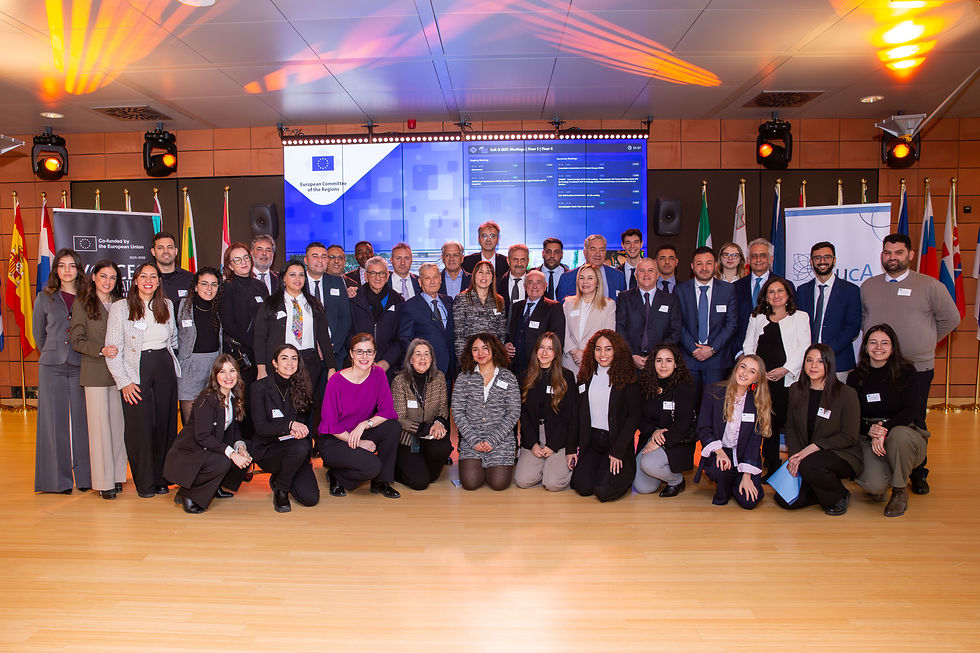VOICES From Migrations | Italo Rubino's story
- Changemakers
- Jun 30, 2025
- 3 min read
Updated: Aug 12, 2025
“VOICES From Migrations” is a project co-financed by the European Union that gives voice to the untold stories of migrants. Italo Rubino is 74 years old and moved from Trieste to Brussels in 1974, in search of professional growth. This is his story.

“I am part of an extraordinary migration, which I would dare to define as ‘intellectual’. After obtaining my diploma as a translator, I decided to emigrate to Belgium because it offered me more job opportunities and it was the only European capital, in my field, to allow this. I arrived in Brussels on 1 May 1974 and after a year of training as an interpreter, I won a competition to become a translator and in 1975 I began my working career. My life has been full of successes and trips abroad, which ended with the role of head of department.
My experience of integration was positive: we had contacts thanks to colleagues already present, and this helped me a lot in integrating with the local population. The reputation of the workers of the institutions was good, and there was no hostility, even if the relationships with the local population were limited.
My relationships with the Italian community were very good, even if indirect. The ushers and drivers – often former miners or workers – told us about another emigration, that of the “suitcase of cardboard”. In fact, I had the opportunity to experience two “types” of migration: the cardboard suitcase migration and the intellectual migration. After the mines closed, many reinvented themselves: restaurateurs, greengrocers, pizza chefs. We met them at the markets, in the shops, so it was mostly an indirect relationship.
Many of us came with the idea of staying a few years and returning to Italy. In the 70s, we were linked to civil and social struggles. There was a constant nostalgia. The Italian community here was compact and active: parties, committees, cultural events. Even abroad, they tried to keep the Italian identity alive. Today, I would return to Italy, even if it has changed a lot. But the bond remains strong. And we must not forget that Italians have also experienced and practiced racism, inside and outside the borders.”
Interview by: Hajdu Zalán, Emma Urso, Fiorella Rodríguez, Ignazio Cammilleri
Read the article in My House of European History:
Original story in Italian: “Io faccio parte di una migrazione straordinaria, che oserei definire: “intellettuale”. Dopo aver conseguito il diploma di traduttore, ho deciso di emigrare in Belgio perché mi offriva più possibilità di lavoro ed era l’unica capitale europea, nel mio ambito, a permettere questo. Sono arrivato a Bruxelles il 1° maggio 1974 e dopo un anno di perfezionamento come interprete, ho vinto un concorso da traduttore e dal 1975 ho iniziato la mia carriera lavorativa. La mia vita è stata piena di successi e di viaggi all’estero, conclusasi con l’incarico di capo dipartimento.
La mia esperienza di integrazione è stata positiva: avevamo contatti grazie ai colleghi già presenti e questo mi ha molto aiutato nell’inserimento con la popolazione del posto. La reputazione dei lavoratori delle istituzioni era buona e non c’era ostilità, anche se i rapporti con la popolazione locale erano limitati.
I miei rapporti con la comunità italiana erano molto buoni, anche se indiretti. Gli uscieri e gli autisti – spesso ex minatori o operai – ci raccontavano un’altra emigrazione, quella della “valigia di cartone”. Infatti, ho avuto modo di conoscere due “tipi” di migrazione: quella della valigia di cartone e quella intellettuale. Dopo la chiusura delle miniere, molti si reinventarono: ristoratori, fruttivendoli, pizzaioli. Noi li incontravamo nei mercati, nei negozi, quindi era un rapporto soprattutto indiretto.
Molti di noi sono venuti con l’idea di restare pochi anni e tornare in Italia. Negli anni ’70 eravamo legati alle lotte civili e sociali. C’era una nostalgia costante. La comunità italiana qui era compatta e attiva: partiti, comitati, eventi culturali. Anche all’estero si cercava di mantenere viva l’identità italiana. Oggi tornerei in Italia, anche se è cambiata molto. Ma resta forte il legame. E non bisogna dimenticare che anche gli italiani hanno vissuto e praticato il razzismo, dentro e fuori i confini.”
Intervista di: Hajdu Zalán, Emma Urso, Fiorella Rodríguez, Ignazio Cammilleri

Funded by the European Union. Views and opinions expressed are however those of the author(s) only and do not necessarily reflect those of the European Union or the European Education and Culture Executive Agency (EACEA). Neither the European Union nor EACEA can be held responsible for them.



Comments